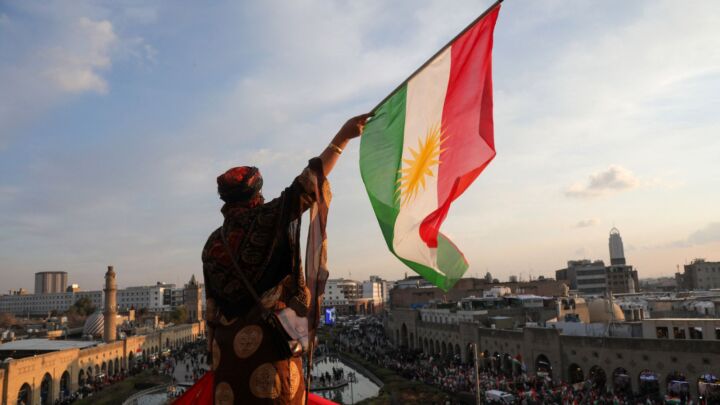Reminder to the British media: Irish people are not savages

Want unlimited, ad-free access? Become a spiked supporter.
Some prejudices never go away. They just shape-shift. New, more PC words are invented so that ugly old ideas can be expressed in a guilt-free way. Take the idea that people on the island of Ireland are given to violence and only the caring British state, Mother Britain, can keep them apart. This rank notion, so widespread in the British media during the Troubles in the 1970s and 80s, has made a comeback through the controversy over the Tories’ deal with the DUP. Listening to political observers, you’d be forgiven for thinking the Northern Irish populace is forever on the cusp of sectarian war, one hissy fit away from religious bloodshed, and this dodgy deal might push them over the precipice.
Theresa May’s ‘desperate deal’ – through which she’s shoring up her shattered authority in parliament by entering into a confidence-and-supply arrangement with the pro-Union, pro-British DUP – could have ‘terrifying implications for peace’, cries the Mirror. This deal, signed today, will put ‘peace at risk’, wrote former Labour Northern Ireland secretary Peter Hain in the Guardian. The Guardian’s Martin Kettle says the deal is a ‘destructive pact’ that threatens to rip apart the ‘fragile’ peace ‘between Northern Ireland’s Unionists and nationalists’. They’re just waiting to get at each other, those people, and one misstep by us Brits will give them the reason they need.
‘Fragile’ – that word is everywhere. The peace in Ireland is ‘fragile’, apparently, and Britain must do everything it can do maintain it or else those children across the Irish Sea will be up to their violent antics again. This deal could ‘damage a fragile peace’, says the National in Scotland. It has ‘cast a cloud of uncertainty over fragile efforts’ to bring peace to Northern Ireland, it says. Former PM John Major says the ‘fragile peace’ might be overturned if the British government is seen to favour one side over the other – then ‘one or other of the communities [might become] so aggrieved that the hard men, who are still there lurking in the corners, decide that they wish to return to some form of violence’. Those dark, aggrieved corners of Ireland: fear what hides there.
How exactly is a Tory-DUP deal meant to unleash conflict? Because it could undermine the commitment made by the British government in the 1999 Good Friday Agreement peace accords that it will be a neutral player in Ireland. In the words of Jonathan Powell, who was chief of staff to Tony Blair when he was PM, the government should not ‘go down this path’ because dark tensions could be unleashed: ‘How on Earth are we going to mediate between Unionists and nationalists?’, he asked. The Mirror misreported ‘mediate’ as ‘medicate’, which is a Freudian slip if ever I heard one: I mean, can’t we drug these strange, conflictual people, especially the ones lurking in corners?
Let’s leave aside that you have to be one of the most historically clueless people in Britain to believe that the British government has ever been a neutral arbiter on the small matter of maintaining its role and influence in Ireland. More striking than that is the British media and political classes’ ongoing attachment, addiction even, to the foul view of people in Ireland as always close to war, kept away from each other’s throats by the good if necessarily fragile efforts of us outsiders.
A fairly typical Troubles-era cartoon
This nasty prejudice fuelled much of media discussion of the Troubles 30 and 40 years ago, giving rise to columns and cartoons that depicted the Irish, both nationalists and Unionists, virtually as savages, as monkey-like creatures that we Brits, with a little help from Dublin officials, had to pacify and civilise. It was historically illiterate then, overlooking the very specific, late-1960s conditions of Unionist and British repression and officially endorsed sectarianism in jobs and other areas that nurtured war – and it’s far more historically illiterate now. More than ever, the colonial-like idea that We must keep Them in order, keep them in a fragile peace, has no basis in anything other than prejudice – one of the oldest of the British elite’s prejudices.
Brendan O’Neill is editor of spiked.
£1 a month for 3 months
You’ve hit your monthly free article limit.
Support spiked and get unlimited access.
Support spiked – £1 a month for 3 months
spiked is funded by readers like you. Only 0.1% of regular readers currently support us. If just 1% did, we could grow our team and step up the fight for free speech and democracy.
Become a spiked supporter and enjoy unlimited, ad-free access, bonus content and exclusive events – while helping to keep independent journalism alive.
———————————————————————————————————————————–
Exclusive January offer: join today for £1 a month for 3 months. Then £5 a month, cancel anytime.
———————————————————————————————————————————–
Monthly support makes the biggest difference. Thank you.









Comments
Want to join the conversation?
Only spiked supporters and patrons, who donate regularly to us, can comment on our articles.